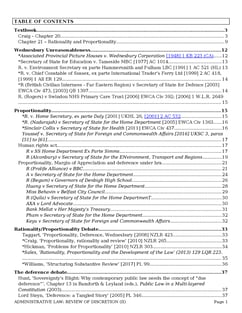Anisminic v Foreign Compensation Commission [1968] 2 QB 862 (CA)
Judgement for the case Anisminic v Foreign Compensation Commission
KEY POINTS
An error of law committed by an administrative body, even if it falls within the body's jurisdiction, is still an error that can render the decision ultra vires (beyond the powers) and therefore subject to judicial review.
FACTS
Anisminic Ltd owned mining properties in the Sinai peninsula, which were seized by the Egyptian government before November 1956 due to the Suez Crisis. Anisminic subsequently sold these properties to The Economic Development Organisation (TEDO), a company owned by the Egyptian government, in 1957.
In 1959 and 1962, Orders in Council were enacted under the Foreign Compensation Act 1950. These Orders aimed to distribute compensation paid by foreign governments (in this case, the Egyptian government) to the UK government for the nationalization of British properties.
Anisminic asserted that they were entitled to compensation under the Orders in Council for the properties seized by the Egyptian government. The claim was submitted to a tribunal established under the Foreign Compensation Act, known as the Foreign Compensation Commission.
The tribunal, responsible for determining eligibility for compensation under the Orders, ruled that Anisminic was not eligible for compensation. This decision was based on the interpretation that TEDO, as the "successors in title" to Anisminic's properties, did not possess British nationality as required by the Orders.
The central issue before the court was whether the tribunal's decision was conclusive and whether the court had jurisdiction to review the decision.
JUDGEMENT
Appeal allowed.
COMMENTARY
This decision brought greater clarity and certainty to the principles of administrative law. It provided a clear standard for when decisions could be challenged and quashed on the basis of an error of law. This clarity has been lauded for enhancing the rule of law and promoting fairness in administrative decision-making.
ORIGINAL ANALYSIS
The Egyptian government nationalized Plaintiff’s properties in Egypt. Plaintiff then sold the mining properties to an Egyptian government-owned company.
A piece of subordinate legislation was passed under the Foreign Compensation Act 1950, to distribute compensation paid by the Egyptian government to the UK government with respect to British properties it had nationalized. Plaintiff said it was eligible for compensation under this piece of subordinate legislation, which was determined by a tribunal (the respondents in this case) set up under the Foreign Compensation Act 1950.
The tribunal however, decided that the appellants were not eligible for compensation, because their "successors in title" did not have the British nationality as required under one of the provisions of the subordinate legislation. There was a clause in the statute saying that "The determination by the commission of any application made to them under this Act shall not be called into question in any court of law".
-
HL held that:
The word “determination” in the statutory “ouster” clause did not include conclusions reached outside of the tribunal’s jurisdiction i.e. a determination made without jurisdiction was not a determination;
jurisdiction was construed broadly, including embarking on unauthorised enquiry/ exercising powers in an unauthorised manner e.g. going against rules of natural justice; and
A mistake of law (apart from some exceptional circumstances, per Lord Wilberforce) was a factor on which the tribunal’s jurisdiction depended.
Lord Reid
Jurisdiction has a narrow meaning: is the tribunal entitled to enter on the inquiry in question.
However sometimes, even where the tribunal had jurisdiction it may do something that renders its decision a nullity e.g. giving a decision in bad faith, making a decision that it had no power to make, failure of “natural justice”, error of law, failure to take into account a relevant fact, taking into account a fact when it was not entitled to do so - non exhaustive list.
Provided DM has jurisdiction and doesn’t fall foul of the these elements, DM is “as much entitled to decide that question wrongly as it is to decide it rightly”. Here the tribunal made an error in law i.e. misconstrued the meaning of “successor in title” in the act.
Lord Pearce
He uses a broad definition of “jurisdiction”, saying that there is no jurisdiction where the elements mentioned by Lord Reid are included e.g. there is no jurisdiction if there is no natural justice.
Lord Wilberforce
He supports Lord Reid, saying that a tribunal might properly operate within its jurisdiction (i.e. make an enquiry that it is entitled to make) but nevertheless make a decision that is void (not merely erroneous) e.g. the points made by Lord Reid.
----
Whether the majority considered that “jurisdiction” is narrow but there are many other grounds for voiding a decision or that jurisdiction is broad, including what Lord Reid considers other matters, is irrelevant. Lord Wilberforce even said we shouldn’t get too caught up in the debate about what exactly “jurisdiction” means. The important point is that the courts assume a wide berth of scrutiny and minimise area of non-justiciability.
RELATED CASES
For Further Study on Anisminic v Foreign Compensation Commission
Need instant answers? Our AI exam tutor is here to help.
Ask questions 🙋 Get answers 📔 It's simple 👁️👄👁️
Our AI is educated by the highest scoring students across all subjects and schools. Join hundreds of your peers today.
Get StartedSimilar Cases
Related Product Samples
These product samples contain the same concepts we cover in this case.

 Since 2010, Oxbridge Notes has been a trusted education marketplace, supplying high-quality materials from top achievers at universities like Oxford, Cambridge, LSE, Harvard, and Yale.
Since 2010, Oxbridge Notes has been a trusted education marketplace, supplying high-quality materials from top achievers at universities like Oxford, Cambridge, LSE, Harvard, and Yale.